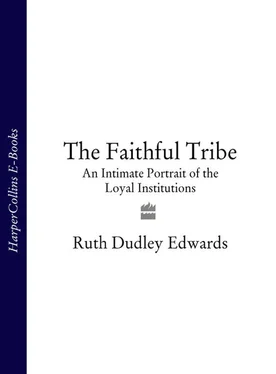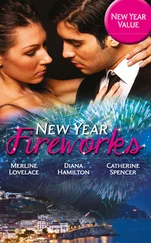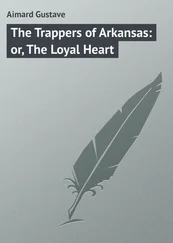Grey, twisted stones, half hid in careless grass,
Scribed with faint names of those who sleep below,
Who once saw winter into summer pass,
Felt dawn in Ulster, watched her sunset glow
O’er every hill they furrowed with the plough,
On the white walls of homestead and of byre
Loved beyond death, even as men love them now,
With a devotion burning like a fire.
Graves of the men of Ulster, who came forth
To seek a better country than their own,
As Abraham from Ur once quested north
Obedient to the faith which led him on.
Obedient down the wandering of the years
Through many a hope deferred, a plan delayed,
Claiming the land for ever by his tears Shed at
the grave where his dear dust was laid.
So by these graves we claim the country still,
This land made rich by sacrifice and tears,
Held with such passionate love, such stubborn will, Tom from the people oft down bitter years,
Spoiled by the hirelings of a servile court,
Harried by prelates of a faith denied.
The rebels’ plunder and the landlords’ sport,
Yet loved of those who tilled her fields, and died,
And dying passed into her kindly mould
To sanctify for us each kirkyard green,
Each sheltered vale and every hillside cold,
And little highways where their feet have been.
Thus do we claim our country from the lord
As Abraham claimed his at Machpelah’s cave,
From age to age still runs the changeless word,
‘The land is his who claims it by a grave.’
It came as no surprise that such an anti-Episcopalian poem had been written by a Presbyterian minister. What was more surprising was that he was a distant kinsman of Henry’s, for I had thought all of his blood were farmers or businessmen apart from the odd engineer. And Henry was able to tell me the story that had inspired such ardent love of Ulster and such bitter denunciation of his ancestors’ persecutors.
The paternal family of the poet, John Worthington Johnston, had farmed south of the border in County Monaghan from King William’s time until, in the 1860s, as a result of some skulduggery by the landlord and his steward, who wanted the prosperous farm for himself, they had to move. In the Clogher Valley, Johnston’s grandfather started afresh and turned unproductive land into a fertile farm; he had seven children, including one who became Henry’s great-grandmother. When Johnston died at fifty-one, his eldest son took over, ran the farm and then became a Presbyterian minister. He had a church in County Antrim and then for a long time served in Dublin. His son John, who was born south of Dublin, was only twelve when his father’s church, the Abbey, was burned down during the 1916 Easter Rising.
John Johnston graduated from Trinity College Dublin with first-class honours in Classics and from Cambridge University with a first in Theology and then, like his father before him, became a minister in County Antrim. In October 1942 he joined the 1st Battalion of the Royal Ulster Rifles, in the 6th Airborne Division, and served as one of the small number of ‘parachute padres’ until invalided out in 1945 after a parachute jump that went wrong. Of his three daughters, one became a distinguished historian and the other two senior civil servants, one of whom later became, like her father and grandfather, a Presbyterian minister.
The story of the Johnstons is an illustration of how, until very recently, almost the only acceptable way for any rural Presbyterian to follow an intellectual route was through the ministry. And equally graphically, his poem shows how even one of the loftier intellects among Presbyterian ministers kept true to his roots. Being elected by the members of their congregation, and running their kirk hand-in-hand with their elders, keep ministers humble and in touch with reality.
In his book on Presbyterians, the Reverend John Dunlop described the Bible as ‘the book of a pilgrim people’, which goes a long way towards explaining why they identify so much with the Israelites of the Old Testament, an aspect of their collective psyche represented throughout the rituals of the Orange and Black institutions. There was not a man walking in an Orange collarette down that hill from Glenageeragh, thinking about Drumcree, in whom Johnston’s poem would not have struck a deep chord.
7. Rossnowlagh, 5 July 1997
The annual Orange parade in Rossnowlagh, County Donegal, in the Republic of Ireland, challenges two beliefs: the first that Orange marches are inherently territorial and triumphalist; the other that a United Ireland would stamp out the Protestant identity.
The truth is more complicated. Northern Irish Orangemen love the Rossnowlagh parade because there is no trouble and nothing to prove: citizens of the Republic of Ireland – in so far as they are aware of the parade’s existence – are happy about it because they think it shows how tolerant they are. Yet the Orangemen of the Republic of Ireland are very aware that since the foundation of the Irish Free State, for a variety of reasons – including persecution by the IRA at a local level – Orangemen are down to just one parade a year at the seaside and away from any towns. And all Protestants, North and South, are aware that since partition, while the Catholic population of Northern Ireland has increased steadily, the Protestant population in the Republic has decreased from 10 to 3 per cent. Many believe that they were persecuted; some that they were ethnically cleansed.
Still, Rossnowlagh is every romantic Orangeman’s idea of a happy family day out. You have the countryside, you have the seaside and there are no protesting nationalists. The parade is policed by two or three amiable gardaí. Or, as one Orangeman put it to me: ‘You walk into Rossnowlagh and there’ll be one guard saying: “How’re ye doin’, boy?” ’
It is an outing, it is an adventure, for it involves foreign travel and it is a way of linking up again with those of your comrades, your brothers, who found themselves after partition on the wrong side of the border. Of all the parades I attended, it was the one most redolent of a school outing in an innocent world: no khaki, no guns, no nasty graffiti, not a hint of violence and therefore, of course, no television cameras. Yet, since Rossnowlagh happens the day before the Drumcree church parade, a lot of people present were fearful about what might happen the following morning. So was I, but being a stranger there, my more immediate concern was how to find the right place on time and where to park my car.
There had been consternation among some of the Northern Irish brethren when they discovered that I was going to Rossnowlagh on my own. Gordon was distressed because a business engagement meant he couldn’t drive me there. Roy was on my mobile worrying that because of a funeral he couldn’t take me, but he gave me details of how to find people there who would look after me and invited me to tea in his Orange Hall in Fermanagh on my way home. Brian was also frustrated at not being able to come; he contemplated but proved unable to bring forward the service he was taking at a different funeral.
How long to get there, I asked Graham, whose favourite parade it is but who this year was doing duty elsewhere looking after the young at a Bible study camp. ‘Well, of course it’s fine while you’re in Northern Ireland,’ he explained, ‘because the roads are very good, but once you get over the border they’re absolutely dreadful, so you’ll have to allow about two hours.’ ‘You lot are always going on about the Republic’s bad roads like a kind of defence mechanism,’ I said. ‘It’s not confined to that,’ he said. ‘Every time I spend a few days in the Republic of Ireland I know more than ever I don’t want to be part of a United Ireland.’ He paused. ‘But then maybe when you’re abroad, you always see the worst of it the longer you’re there.’ ‘Why doesn’t that apply to home?’ I asked, and he replied, Oh, that’s different. That’s like saying that your house needs a bit of renovation.’
Читать дальше












